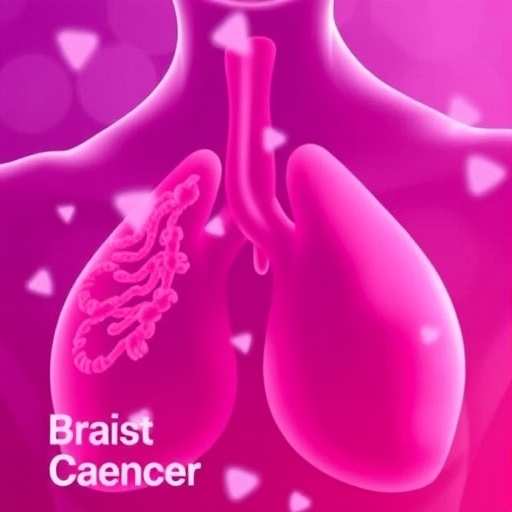In a groundbreaking study emerging from the University of Cambridge, researchers have revealed the immense clinical potential of whole genome sequencing (WGS) for breast cancer patients, signaling a transformative leap in how this prevalent disease could be diagnosed and treated on a national scale. With breast cancer affecting millions worldwide and remaining a formidable health challenge, this detailed genomic approach promises to revolutionize personalized medicine by harnessing the intricate genetic architecture of tumors.
Whole genome sequencing entails decoding the complete DNA sequence of both the patient’s normal cells and their cancerous tissue. This comprehensive analysis unveils a catalog of genetic alterations driving tumor behavior, including mutations, structural changes, and complex mutational signatures. Unlike traditional methods that focus on a limited set of genetic markers, WGS provides a panoramic view of the tumor’s molecular underpinnings, offering unprecedented insight into its vulnerabilities and resistance mechanisms.
The study focused on an extensive cohort of nearly 2,500 women with breast cancer across England, leveraging the rich dataset housed within the National Genomic Research Library, a uniquely comprehensive repository managed by Genomics England. These genomic data were intricately linked with clinical records and mortality statistics over a span of five years, enabling a robust retrospective investigation into genetic markers predictive of treatment response and survival outcomes.
Remarkably, the researchers identified that over a quarter—27%—of breast cancer cases harbored identifiable genetic features that could immediately inform and refine treatment strategies. This significant finding translates to a potential impact on more than 15,000 women annually in the UK alone. Among these actionable features was homology-directed repair deficiency (HRD), a hallmark of impaired DNA repair machinery found in approximately 12% of breast cancers, which is known to sensitize tumors to specific classes of drugs such as PARP inhibitors.
Beyond HRD, the genomic profiling unearthed a spectrum of unique mutations that open therapeutic windows to targeted treatments and clinical trials. Moreover, the detection of mutations conferring resistance to hormone therapies signals a need for alternative treatment pathways, underscoring the complexity of tumor evolution and the necessity for comprehensive genomic interrogation. Mutational patterns such as APOBEC signatures and TP53 gene alterations emerged as potent prognostic indicators, outperforming traditional clinical metrics like tumor grade or patient age.
The analysis further revealed an additional 15% of cases with genetic hallmarks poised to enrich future research endeavors, reflecting defects in other DNA repair pathways and novel mutational processes yet to be fully exploited therapeutically. This cohort could represent over 8,300 women each year who might benefit from next-generation precision oncology trials and therapies, pending further scientific validation.
One of the most compelling aspects of the study involves the development of a novel prognostic framework derived from WGS data. This system enables clinicians to stratify patients more accurately according to the aggressiveness of their disease, providing actionable guidance on the intensity of treatment required. Notably, the framework suggests that approximately 7,500 women annually with low-grade tumors could safely receive more aggressive intervention to improve outcomes, challenging existing paradigms of breast cancer management.
Despite its promise, the integration of WGS into routine clinical care via the NHS Genomic Medicine Service remains limited. Cost reductions, such as Ultima Genomics’ recent announcement pricing human genome sequencing at $100, signify a commercial breakthrough that should catalyze broader healthcare adoption. However, the vast complexity and sheer volume of genomic data present interpretative challenges that require sophisticated bioinformatics tools and clinical expertise.
Professor Serena Nik-Zainal, a leading expert in genomic medicine at Cambridge, emphasizes that while WGS offers a treasure trove of information, its clinical utility is hampered by a scarcity of large-scale validation trials and the daunting task of distilling actionable insights from the data-rich landscape. The ongoing study bridges this gap by providing population-level evidence to justify routine WGS implementation, setting the stage for precision oncology to become standard care for common cancers like breast cancer.
The potential applications of WGS extend beyond individual patient care to fundamentally reshape clinical trial recruitment and design. By capturing the entire genetic profile of tumors, clinicians and researchers can match patients to multiple trials simultaneously, bypassing the traditional limitation of recruiting based on singular biomarker targets. This paradigm shift promises to accelerate drug development and deliver novel therapies at an unprecedented pace.
At the heart of this genomic revolution is the upcoming Cambridge Cancer Research Hospital, a forward-looking NHS facility set to integrate hospital care with world-leading research under one roof. The hospital will house the Precision Breast Cancer Institute, dedicated to applying cutting-edge genomics to optimize treatment regimens, enhancing therapeutic efficacy while minimizing harmful side effects. This initiative epitomizes the fusion of genomics and clinical medicine to tackle breast cancer’s complexity.
Financially supported by several esteemed institutions, including the National Institute for Health and Care Research, the Breast Cancer Research Foundation, and Cancer Research UK, this research underscores the power of collaborative efforts in pushing the boundaries of cancer genomics. The data-driven insights afforded by WGS herald a new era where breast cancer treatment is tailored with unparalleled specificity, improving survival and quality of life for thousands of patients each year.
In summary, whole genome sequencing stands poised to revolutionize breast cancer care by enabling precision medicine on a scale never before achieved. The ability to decode the complete genetic blueprint of tumors uncovers hidden vulnerabilities and resistance mechanisms, offering personalized therapeutic options and prognostic clarity beyond traditional assessments. With further adoption and integration, WGS may become the cornerstone of breast cancer management, fundamentally altering patient outcomes and clinical research landscapes.
Subject of Research: People
Article Title: Revealing the clinical potential of cancer whole-genome data: A retrospective analysis of a breast cancer cohort in England linked with mortality statistics
News Publication Date: 7-Oct-2025
Keywords: Breast cancer, Genomics, Genome sequencing, Clinical trials, Cancer, Cancer treatments
Tags: breast cancer researchclinical potential of WGSgenetic alterations in tumorsgenomic data analysismutations and resistance mechanismsNational Genomic Research Librarypersonalized medicine advancementstransformative healthcare approachestumor behavior insightsUniversity of Cambridge studywhole genome sequencingwomen diagnosed with breast cancer





